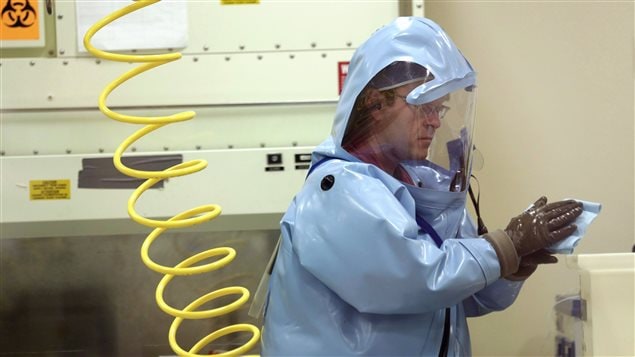An employee at Canada’s national animal health laboratory in Winnipeg, in the Western province of Manitoba, may have been exposed to the Ebola virus yesterday, federal officials say.
The employee of the National Centre for Foreign Animal Disease (NCFAD) was wearing a protective suit and noticed a split in the seam, officials told reporters Tuesday.
The employee, whose identity was not released due to privacy reasons, was evaluated by an infectious disease specialist and has put himself in isolation for 21 days — the maximum time from Ebola infection to the onset of symptoms, said Dr. John Copps, director of the Canadian Food Inspection Agency (CFIA).
The risk to the public is considered low because the individual is not showing any symptoms and is not considered infectious, officials said Tuesday.
The employee was working with pigs that had been experimentally exposed to Ebola when he noticed a split in his suit. The incident happened during standard decontamination procedures before exiting the lab.
The individual was offered the Canadian-developed experimental Ebola vaccine but again, citing privacy concerns, officials would not say whether or not he accepted the vaccine.

The anesthetized pig was one of six infected with the Ebola virus as part of the lab’s research into whether treating with interferon affects the course of the disease, Copps said.
The NCFAD lab in Winnipeg is one of only a handful of North American labs capable of handling pathogens that require the highest level of containment.
“As we all know, Ebola virus is an important disease and as such, we’re trying to find pre-treatments to establish disease prevention in people.”
It’s not clear how the tear in the suit developed. The suits are supposed to be checked at least once a week and this was a relatively new suit that was checked rigorously, Copps said.
“Our employees are well aware of the risks and how to control them,” Copps said.
Ebola, which is spread through direct contact with bodily fluids, has killed more than 11,300 people, mostly in West Africa.
The World Health Organization said earlier this year that Ebola is no longer an international health emergency, but added that flare-ups, at decreasing frequency, are expected.
With files from CBC News and The Canadian Press







For reasons beyond our control, and for an undetermined period of time, our comment section is now closed. However, our social networks remain open to your contributions.